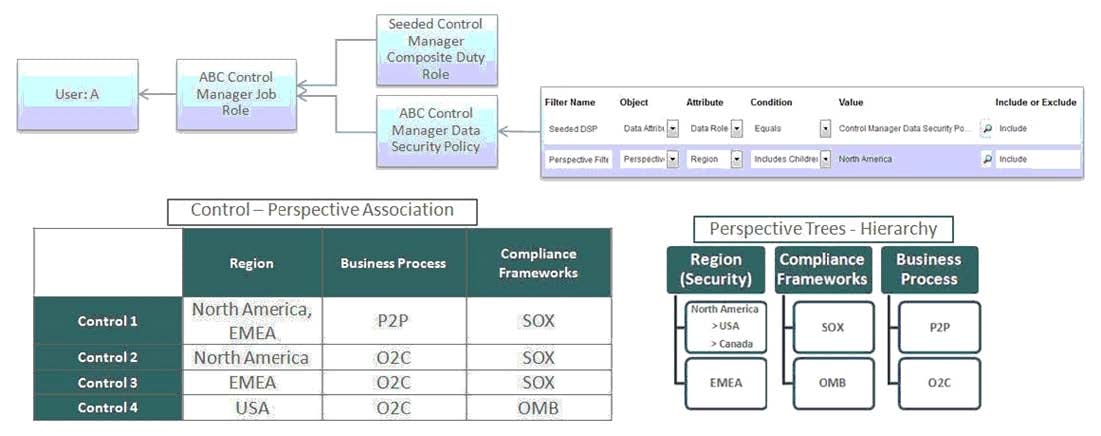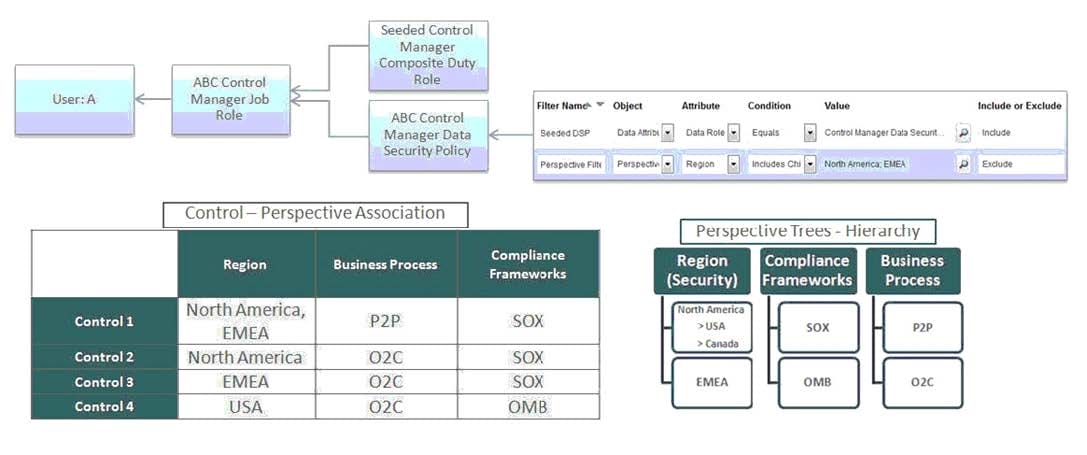1Z0-958 Online Practice Questions and Answers
You are implementing Advanced Access Controls and there is a requirement for a control to monitor user
access to specific, client-defined access points which give users the ability to both initiate a purchase order
and approve payments on that purchase order.
Which is a valid option to implement the control?
A. From the "Access Entitlements" page create two entitlements containing the respective client-defined access points. Create an access model from the "Models" tab of Advanced Controls, based on the entitlements you created.
B. Select Actions > Create Access Control from the "Controls" tab of Advanced Controls.
C. Create an access model from the "Models" tab of Advanced Controls, and then define an access point filter for each individual client-defined access point.
D. From the "Access Entitlements" page create two entitlements containing the respective client-defined access points. Create an access model from the "Models" tab of Advanced Controls, based on the entitlements you created. Finally, deploy an access control in the "Controls" tab of Advanced Controls, and select the access model you created.
E. Create an access entitlement from the "Access Entitlements" page, then select Actions > Create Access Control from the "Controls" tab of Advanced Controls, and select the entitlement you created.
Which controls can user A manage for the following Control Manager role Configuration? See details of perspective trees and control-perspective association below.

A. All controls
B. Controls 2 and 4
C. Controls 1, 2, and 4
D. None
E. Controls 1 and 2
You have built a transaction model to identify possible duplicate charges between invoicing and expense credit cards. The model logic already includes two standard filters that identify amounts and suppliers that are the same or similar, as shown:

Which additional date filter will further refine the set of duplicate charges found?
A. The "Payables Invoice" object's "Invoice Date" attribute is greater than the "Expense Report Credit Card Transaction" object's "Transaction Date" attribute.
B. The "Expense Report Credit Card Transaction" object's "Last Updated Date" attribute is greater than the "Relative Value" of 3 months.
C. The "Expense Report Credit Card Transaction" object's "Transaction Date" attribute is not blank.
D. The "Payables Invoice" object's "Invoice Date" attribute is similar to the "Expense Report Credit Card Transaction" object's "Transaction Date" attribute within +/- 10 days.
Which two would need to happen in order for Advanced Access Controls (AAC) to automatically assign a status of "Closed" to an access incident? (Choose two.)
A. The incident is resolved in Fusion Cloud and a subsequent evaluation of controls finds that the incident no longer exists.
B. A global condition was added that resolves the conflict and a subsequent evaluation of controls finds that the incident no longer exists.
C. A user sets the State of the incident to "Remediate".
D. The incident is resolved using simulation in AAC and a subsequent evaluation of controls finds that the incident no longer exists.
E. A user sets the Status of the incident to "Resolved".
A Control Manager has changed the status of an issue to "In Remediation" and has submitted it. What will be the state of the Issue if there is no issue validator, reviewer, or approver configured?
A. In Review
B. Active
C. Reported
D. Approved
E. In Edit
An organization has a list of companies with which they no longer wish to do business. The list is not
stored in their ERP Could but is stored in a file.
Which transaction model will identify payments made to these companies?
A. Create an Imported business object that can be used in conjunction with Oracle's pre-built "Payment" object. One both objects are in your model, add this standard filter: the "Payment" object's "Remit to Supplier Name" is similar to the custom object's "Company Name" by 95%.
B. Add a configurable attribute "Company Name" to Oracle's pre-built "Payment" object. Then add this standard filter: "Remit to Supplier Name" equals "Company Name".
C. You cannot define this model because imported objects from a file cannot be used with delivered objects.
D. Create an Imported business object that can be used in conjunction with Oracle's pre-built "Payables Invoice" object. Once both objects are in your model, add this standard filter: the "Payables Invoice" object's "Supplier Name" equals the custom object's "Company Name".
Which statement related to Advanced Access Controls is true?
A. If helps enforce segregation of duties.
B. If helps perform risk analysis and evaluation.
C. It analyzes transaction records.
D. It documents risks and controls.
Which two options can be assigned to a duty role? (Choose two.)
A. Functional Security Policy
B. Abstract Role
C. Data Security Policy
D. Job Role
You have created security roles for the Procure-to-Pay (P2P) Control Manager for the EMEA region in your
client's organization. But, there are two problems with his or her security configuration.
Problem 1: This person should not receive notifications to complete control assessments, but currently he
or she does.
Problem 2: Also, although he or she has access to controls associated with EMEA, he or she is unable to
access controls created for individual regions within EMEA.
You have given him or her the following job role:
EMEA P2P Control Manager Job Role
-
Seeded Control Manager Duty Composite
-
Seeded Control Certification Assessor Duty Composite
-EMEA P2P Control Manager Data Security Policy
-Seeded Control Manager Data Security Policy
-
Perspective filter where Region Perspective "equals" EMEA
-
Perspective filter where Process Perspective "equals" P2P
Which two actions need to be taken to correct the problems? (Choose two.)
A. Remove Control Certification Assessor Composite from the EMEA P2P Control Manager job role.
B. Create EMEA P2P Control Certification Assessor Data Security Policy striped by both EMEA and P2P perspectives and assign to the job role.
C. Add to the EMEA P2P Control Manager Data Security Policy the seeded Control Certification Assessor Data Security Policy.
D. While defining data security policy, set the perspective value to EMEA including all child nodes of the EMEA region.
Which controls can user A access and manage for the following Control Manager role configuration? See details of perspective trees and control-perspective association below.

A. None
B. Controls 2 and 3
C. Only Control 1
D. All controls
E. Controls 1, 2, and 3
You are implementing Advanced Access Controls for a client. You need to create a model that returns users who have been assigned a specified access point but excludes a specific operating unit. Which business object(s) do you need to add to your model to accomplish this objective?
A. Access Point and Fusion Access Condition
B. Access Entitlement
C. Access Point and User Business Object
D. Access Point
E. Fusion Access Condition
You have defined an initial Perspective Hierarchy for your client in the Advanced Controls module. After
refining their business requirements, your client wants to expand the existing hierarchy to include 150
perspective items in various levels.
For efficient processing, you decide to use the GRC data migration feature to import the new items.
Which three are valid processing steps required to define the export file? (Choose three.)
A. Navigate to Risk Management Tools > Setup and Administration > Data Migration, and select Advanced Controls.
B. Generate Template as Without Data.
C. Navigate to Manage Module Perspectives.
D. Generate Template as Without Data ?Perspectives Only.
E. Click the Create Import Template button.
Your client has asked you to define a transaction model to identify duplicate invoices based on Invoice
Numbers and Invoice Amounts.
Which two standard filters can be combined to accomplish this? (Choose two.)
A. The "Payables Invoice" object's "Supplier ID" does not equal itself.
B. The "Payables Invoice" object's "Invoice ID" is similar to the "Payables Invoice" object's "Invoice Number".
C. The "Payables Invoice" object's "Invoice Amount" is equal to itself.
D. The "Payables Invoice" object's "Invoice Number" is equal to the "Payables Invoice" object's "Invoice ID."
E. The "Payables Invoice" object's "Invoice Number" is equal to itself.
A user has created and submitted a new control and the state of the control is "In Review." The user expected that the control state would change to "Approved." Why is the control not in the "Approved" state?
A. This user is not a Control Approver; therefore, the status will be "In Review."
B. The Control Reviewer role has been assigned to some users.
C. New controls must always be reviewed, irrespective of security configuration.
D. The Control Approver role has been assigned to some users.
The control manager needs to associate an existing test plan to an additional assessment type, Audit Test.
The existing test plan is associated only with the Design Review assessment type.
How can this be accomplished?
A. The control manager should create a new test plan with Audit Test and Design Review as assessment types.
B. The control's test plan should be updated to include both Audit Test and Design Review as assessment types.
C. The control manager does not need to update the control because any initiated assessment will include all control test plans.
D. The control's test plan should be updated to Audit Test as the assessment type.
